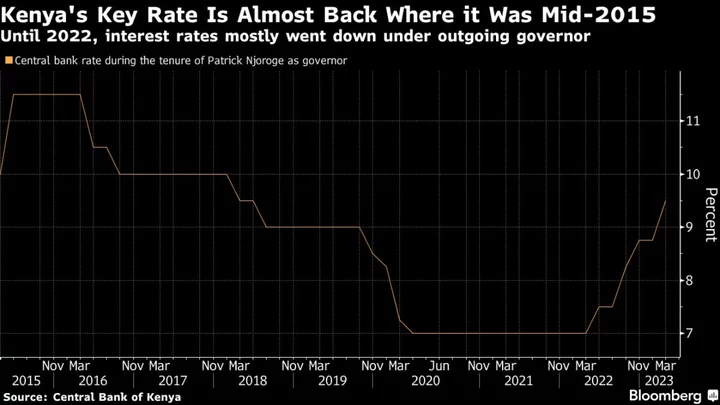Kenya is likely to leave its benchmark rate unchanged, even as a depreciating currency, fuel-price increases and proposed new tax measures stoke inflation.
Five out of six economists polled by Bloomberg forecast the monetary policy committee will hold the rate steady at 9.5% on Monday at its last meeting to be presided over by Governor Patrick Njoroge. President William Ruto has nominated Kamau Thugge to fill the post when it falls vacant on June 17 and lawmakers are due to vet him on Tuesday.
The MPC is facing a dilemma given the weakness of the shilling, ongoing price pressures, the nation’s heavy debt burden and the need to boost economic growth, according to Deepak Dave, an analyst at Toronto-based Riverside Advisory.
“On balance, I believe they will hold the rate and hold their breath to see how the market reacts and how the next quarter plays out economically in Kenya” and in its trading partners, Dave said by email. Gross domestic product grew 4.8% in 2022, and higher rates could mean that even a “tiny recovery in economic activity will be snuffed out,” he said.
The inflation rate, which has remained above the 7.5% upper limit of the central bank’s target since June, is expected to jump after a surprise slowdown in April. One driver will likely be the government’s withdrawal of all fuel subsidies, which has sent diesel prices to a record and increased manufacturing, transport and electricity costs.
The weaker currency will also play a role, with the shilling having depreciated since June 2021 to reach a record low to the dollar last week. The slide has been fueled by expectations that interest rates will remain higher for-longer in the US, a decline in foreign-exchange reserves, a deteriorating balance of payments, and credit ratings downgrade by Moody’s Investors Service and S&P Global Ratings.
Ruto has also proposed a slew of tax increases, including doubling the value-added tax rate on fuel to 16% and a higher excise duty on fees charged for money-transfer services to help finance the budget.
The Kenyan Treasury sees inflation reverting to within the central bank’s target band by the end of June, as commodity and domestic food prices ease.
--With assistance from Rene Vollgraaff.

